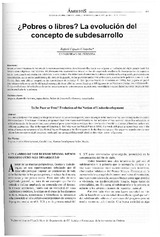¿Pobres o libres?. La evolución del concepto de subdesarrollo
To Be Poor or Free? Evolution of the Notion of Underdevelopment

Ver/
Autor
Cejudo Córdoba, Rafael
Editor
Asociación de Estudios de Ciencias Sociales y HumanidadesFecha
2007Materia
Índice de desarrollo humanoNecesidades
Capacidades
Progreso
Human development index
Progress
Needs
METS:
Mostrar el registro METSPREMIS:
Mostrar el registro PREMISMetadatos
Mostrar el registro completo del ítemResumen
En este artículo trazamos la historia de la noción contemporánea de subdesarrollo, desde sus orígenes a mediados del siglo pasado hasta los
denominados Objetivos del Milenio. El planteamiento economicista inicial se ha ido superando mediante la incorporación de aspectos
inmateriales como la educación o la calidad de la vida política. Paralelamente el concepto de pobreza también se ha enriquecido, pues desde una
consideración inicial como insuficiencia de renta se ha pasado, en los planteamientos más ambiciosos, a concebir la pobreza como falta de
libe rtad. Bajo esta última perspectiva las aportac iones de Ama11ya K. Sen (premio Nobel de economía en 1998), han jugado un papel
determinante en la construcción del actual concepto de desarrollo humano utilizado por el Programa de las Naciones Unidas para el Desarrollo.
En las conclusiones del al1ícu lo exploramos la nueva relación entre recursos económicos, necesidades y capacidades humanas propia de esta
noción ampliada de la pobreza This art icle deals with the history of the prescnt notion of underdevelopment, sin ce its origin in the middle ofthe last century to the so-called
Millenium Goals. Thc former economici st approach has been transcended thanks to the inclusion of non-material issues like education or
political standards. At the same time, conceptions ofpoverty are wider nowadays: from low levels ofwealth to absence offreedom in the most
ambit ious approaches. That is thc case of Amartya K. Sen who won the obel Prize in 1998. His work sti ll plays a momentous ro le in thc
notion of human development of the United Nation Programme for Development. In the fin al remarks of the paper we search into the ncw
rclalion betwcen economical resources, needs and human capabil ities established by this wider notion ofpoverty
